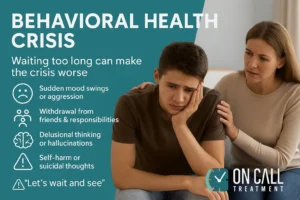When your child is in crisis, everything feels like a risk. You’re terrified of making the wrong move—but waiting feels safer than taking a step you’re not sure about. So you give it another day. Then another. You tell yourself it’s not that bad yet. That maybe things will settle down.
But deep down, you know this isn’t “just a phase.” You know something has shifted—and not in a way that’s going to fix itself.
What many parents don’t realize until they’re already in the deep end is this: waiting too long can quietly make the crisis worse. Not because you’re neglecting them—but because the situation is moving faster than you can control. And sometimes, the only way to break the spiral is with help that’s bigger than you.
That’s where residential treatment comes in. And if you’re in or near Waltham, MA, On Call Treatment offers a calm, structured place to help your child stabilize—and help you exhale.
What a Behavioral Health Crisis Really Looks Like
Let’s start here: a crisis isn’t always dramatic.
Sometimes it’s a series of sleepless nights and slammed doors. Sometimes it’s a child who hasn’t left their room in days. Sometimes it’s paranoia, or refusal to eat, or a terrifying flatness that replaces the child you used to know.
Behavioral health crises come in many forms:
- Sudden mood swings or aggression
- Withdrawal from friends, family, and responsibilities
- Delusional thinking or hallucinations
- Panic attacks or uncontrollable anxiety
- Self-harm or suicidal thoughts
- Refusal to take medications or accept care
You may be told to “ride it out,” especially if your child is legally an adult. But what you’re seeing? It’s not normal teenage rebellion. It’s a real health emergency. And the sooner help steps in, the more options remain on the table.
The Danger of “Let’s Wait and See”
It’s completely human to hesitate. You don’t want to overreact. You don’t want to force your child into something that might damage your relationship. You’re holding on tight, hoping that love and patience will be enough.
But here’s the hard truth: many families wait until things get dangerous—until there’s a 911 call, or a hospitalization, or someone gets hurt—before reaching out for help.
By then, the spiral has often picked up speed. And pulling someone out of it becomes harder, longer, and more traumatic—for everyone involved.
What if seeking help now could prevent the next level of crisis?
What Residential Treatment Actually Does
The term “residential treatment” can feel intimidating if you’ve never encountered it before. It may bring up images of locked hospital wards or harsh environments. But that’s not what we’re talking about here.
At On Call Treatment in Waltham, residential treatment means this:
- A supportive, home-like setting
- 24/7 supervision by mental health professionals
- Stabilization support (including medication if needed)
- Daily therapy (individual and group)
- Skill-building to manage stress, emotion, and safety
- Family communication and involvement
- A pause from external triggers and overwhelm
It’s not a punishment. It’s not a last resort. It’s a place to catch your breath and reorient—not just for your child, but for your entire family system.

Why Earlier Care Often Works Better
In behavioral health, early intervention often means better outcomes.
That’s not just a phrase—it’s backed by evidence. When someone receives care in the early stages of mental illness or substance-related behavior, they’re more likely to:
- Stabilize faster
- Avoid hospitalization or emergency services
- Engage in ongoing care
- Maintain relationships, education, and routines
Delaying treatment often leads to greater distress, broken trust, and fewer options. Residential treatment is one way to intervene early enough that healing can happen with dignity and direction—not just damage control.
You Don’t Need a Diagnosis to Ask for Help
One of the most paralyzing thoughts parents have is:
“But we don’t even know what’s wrong yet.”
That’s okay.
Residential treatment doesn’t require a formal diagnosis. In fact, it’s often the place where assessment begins—where clinicians can observe patterns, identify symptoms, and begin building a plan.
Your job isn’t to diagnose your child. Your job is to love them and keep them safe. Let professionals handle the rest.
This Is Not Your Fault—And You Are Not Alone
There’s something uniquely heartbreaking about watching your child slip into crisis. You may feel guilt, confusion, even shame. You might question everything—what you missed, what you said, what you should have done.
Please hear this:
This is not your fault. And you’re not the only parent feeling this lost.
Every week, we meet families who thought they had time. Who didn’t want to believe things were serious. Who hoped it would pass. Who delayed care out of love and fear and not knowing what else to do.
You’re not behind. You’re here. And that means help is still possible.
What to Expect from Residential Treatment at On Call
If you’re in the Waltham, MA area, On Call Treatment offers residential-level care with a strong focus on compassion, structure, and family support. Our environment is designed to feel safe and human—not sterile or punitive.
We offer:
- 24/7 supervised care from licensed clinicians
- Daily individual and group therapy
- Medication evaluation and management
- Behavioral support and skill-building
- Crisis de-escalation techniques
- Family therapy and ongoing updates
- Support with step-down planning, like IOP or PHP
Your child won’t just be monitored—they’ll be supported, heard, and helped back into their own sense of control.
FAQs About Residential Treatment for Young Adults
What age group is residential treatment best for?
At On Call, we typically serve teens and young adults—roughly 14 to 26—depending on clinical needs. We tailor treatment to age, development, and family dynamics.
What if my child doesn’t want to go?
This is common. Many young people resist care at first. We can help families navigate this conversation and explore all options, including voluntary and (when appropriate) involuntary admissions.
Is residential care only for extreme cases?
No. Residential treatment is for stabilization—not punishment. It’s most effective when used early, before things reach a full-blown emergency. The goal is prevention, not reaction.
How long does residential treatment last?
It varies based on your child’s needs. Some stays are a few weeks. Others may be longer. We work closely with each family to develop a treatment and transition plan that fits your child’s progress and goals.
Will I be kept informed?
Yes. Family communication is central to our process. We’ll involve you in treatment planning, provide regular updates, and offer family support services throughout.
What happens after residential treatment ends?
Our team helps you plan next steps—from outpatient therapy to school reintegration to additional services like IOP or PHP. The goal isn’t just short-term safety—it’s long-term stability.
You’re Doing the Right Thing—Even If It Feels Scary
Making the first call can feel like jumping off a cliff. But the truth is—you’ve been carrying this fear for a long time. You’ve already been through the hard part.
Asking for help isn’t giving up on your child. It’s showing up for them in the most powerful way possible.
You don’t have to have all the answers. You just have to take the next step.
Ready to talk? Call (833) 287-7223 or visit Residential Treatment services in Waltham, MA to learn more about how structured care can help your family. You don’t have to do this alone—and you don’t have to be “worse” to deserve care.

